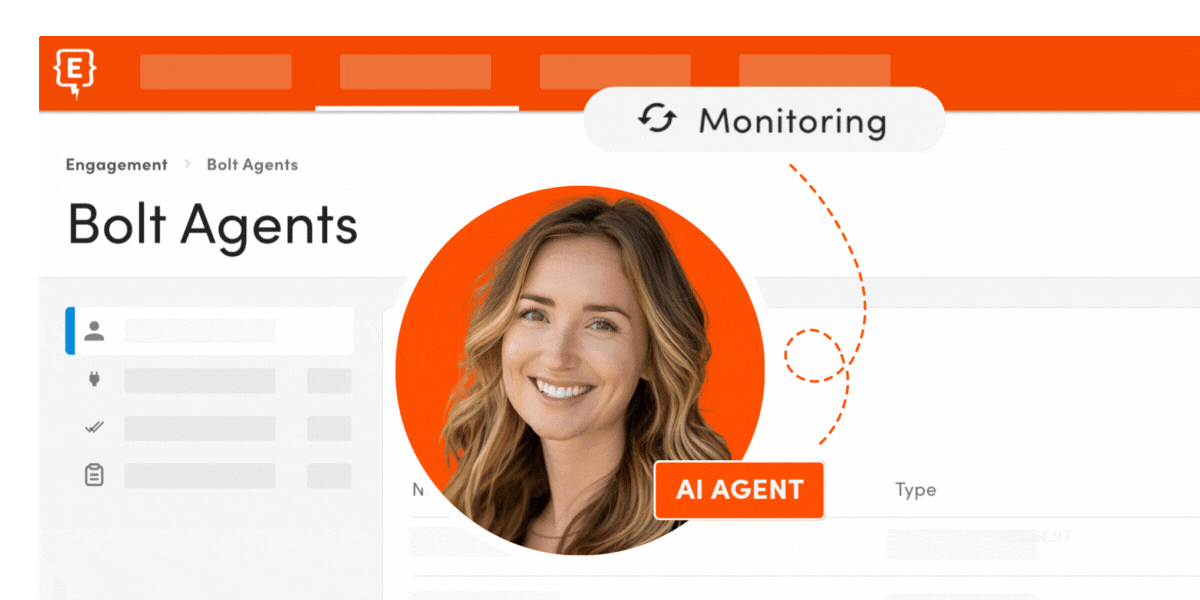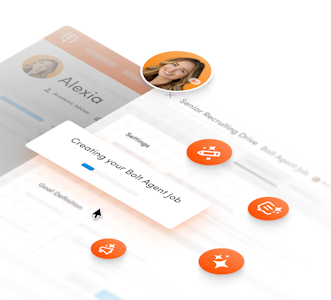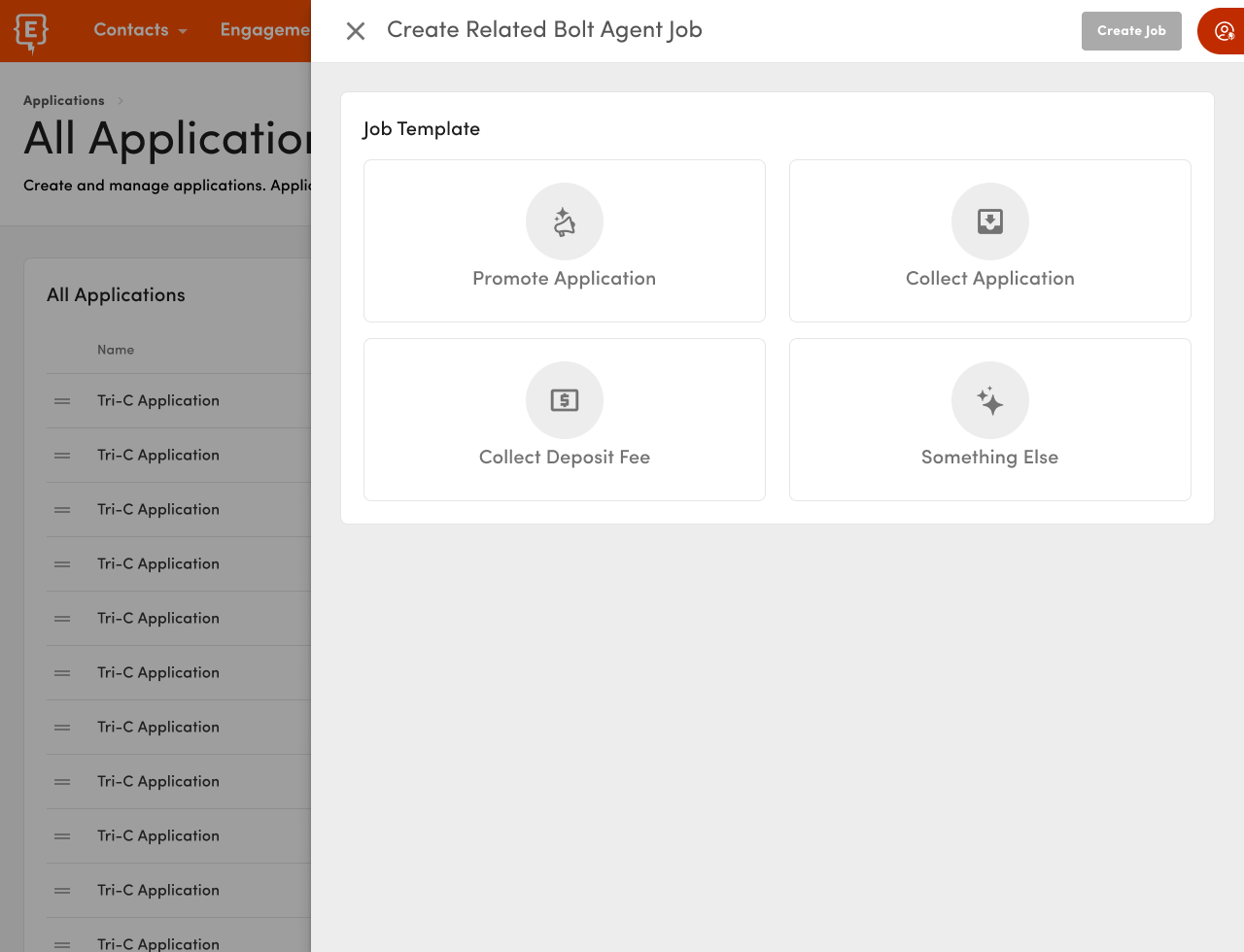Moving Forward in the "New Normal" with Melanie Gottlieb
by Sirley Carballo · Updated Oct 13, 2021

On Episode 2 of the In Your Element podcast, host Eric Stoller has a deep-dive conversation with Melanie Gottlieb, Interim Executive Director at the American Association of Collegiate Registrars and Admissions Officers (AACRAO).
Together, they discuss:
- What are the current challenges facing enrollment management professionals, including registrars?
- How difficult is it for institutions to find people right now to fill roles, especially entry-level positions that have completely changed in scope, responsibilities, and expectations?
- Why do enrollment analytics and predictive models matter?
- What role will Ed Tech play in the future of college recruitment and admissions?
- How do EM and HE leaders in general move forward into a post-pandemic reality?
Listen to Episode 2 of the In Your Element Podcast here.

In the last 18 months, we have changed and changed and changed and changed. This is the new normal, the way higher ed has to be because it's not going to be the same as it was. And we don't actually know what it's gonna look like moving forward, and we're gonna have to learn and adapt, and we're gonna have to do it quickly.

Full Transcript of Episode 2
Melanie
We have this terrible reputation of like, we just can't change. And in the last 18 months, we have changed and changed and changed and changed. This is the new normal, the way higher ed has to be because it's not going to be the same as it was. And we don't actually know what it's gonna look like moving forward, and we're gonna have to learn and adapt, and we're gonna have to do it quickly.
Eric
Welcome to In Your Element, a podcast on the Enrollify Podcast Network brought to you by Element451, and advanced student engagement CRM, providing higher ed institutions with a competitive admissions advantage from recruitment to enrollment through the use of AI. On each show, we ask five questions about current challenges, exciting opportunities, and what's next in higher education. I'm your host, Eric Stoller. And on today's show, we have Melanie Gottlieb, Interim Executive Director of AACRAO, the American Association of Collegiate Registrar's, and Admissions Officers. AACRAO is a nonprofit voluntary professional association of more than 11,000 higher education professionals who represent approximately 2600 institutions and within 40 countries. And Melanie, she's had pretty much all the types of AACRAO roles in her career.
Melanie
So I started my career as an assistant in the registrar's office. That was my first higher ed job and worked my way into becoming a registrar. I moved across the country and then became an international credential evaluator, Director of Admissions, Director of Admissions Operations, did undergraduate and graduate admissions, and then a VPEM. And through all of that, AACRAO was the professional association that taught me how to do my job and gave me my professional network, I sort of grew up as a professional in the association.
Eric
And then in 2021, Melanie was named Interim Executive Director of AACRAO, she leads an organization that focuses on multiple areas in higher ed, from an enrollment and retention standpoint, all the way through graduation.
Melanie
We are the professional association home for people across the enrollment cycle. And so we take care of helping students come into higher education. We take care of them while they are in higher education from an enrollment and retention standpoint, from a records standpoint. Our members also are the sort of guardians and caretakers of the data and the curriculum, and then we help get them to graduate. So that's the umbrella.
Eric
That's a huge umbrella, you got the beginning and the end and some stuff in the middle. I just love that registrars handle graduation. You know, it's sort of an interesting sort of niche for an office that you know, it's like one of the most exciting events for any institution. And my apologies to all my registrar friends, but it's not the most exciting office. Melanie's gonna say nothing to that effect. She's gonna say the registrars are the most exciting segment of the AACRAO family. But, you know, it leads me to my first real question here is, you know, what are the challenges facing today's enrollment management professionals, obviously registrars too, are included in that question.
Melanie
So the challenges facing higher ed professionals in general, and enrollment and records and academic services folks, specifically, look a lot like the challenges facing all of the employment areas right now - we are still in a pandemic. And I have to say that this, the pandemic has infiltrated every aspect of their roles. We started doing these things called coffee breaks at the beginning of the pandemic, where on Friday afternoons at three o'clock, we would have these informal conversations, where they're webinars but you know, no slides, no PowerPoint, really just talking about what's happening. What are you doing about X, Y, or Z challenge? And a lot of things have emerged from those conversations. The first challenge really is just about reinventing their jobs every day. Early in the pandemic, I would talk to folks and on Monday, they would be faced with a set of problems. We have to do this thing differently than we've ever done it before. How are we going to do it? By Wednesday, they'd have a plan, okay, this is how we're gonna do it. By Friday, that plan had probably been tossed out the window, and they've done a complete 180 because there was some new information or some new factor, and it was this endless turn of reinventing their roles. And that was, I think, much more focused on the registrar group earlier in the pandemic. They had to move all the classes online, they had to rethink schedules, they had to come up with a way to deal with graduation, which is like this big benchmark thing that the institution celebrates, and the individual celebrates, and family celebrates, all of that pressure was on them. By the time that was over, not that their pressure got less, but I think the enrollment management and admissions pressure got worse. And I'm looking at a whole bunch of folks who expected to have a particular job. So you think about your admissions, road warriors, and the people who are leading them, they are expected to have a particular job.
Eric
Face to face, going to events, fairs...
Melanie
Counselors do that job because they're really good at connecting with students face to face. And if you've ever been on a webinar, where everyone has their cameras off, and they're trying to recruit, and read the room and get a sense and connect with people, and they're yelling into a hallway, I mean, they really get nothing back. And so those jobs were all different, not jobs that maybe they would have signed up for. And so leading those people was really challenging. I talked to admissions directors and VPs of them who said, you know, every week, I have someone in my office multiple times in my office, meaning in my virtual office on a zoom call, crying, because that just the challenges that they were facing in the job, not to even mention the personal stuff, you know. You're trying to work full time through a pandemic, and you've got whatever, you've got on your personal side. So all of those pressures were just incredible. I think that the enrollment management teams and the admissions teams really went through something that was career-shattering in a lot of ways, and everyone has been pretty raw. And I don't think that we've come out of that, really, you know, we're, we're coming back to campuses this fall. And, you know, I'm seeing people talking about moving. And we're all hoping it's gonna go really well.
Eric
Exactly, exactly.
Melanie
But we don't know. And that's just the immediate challenges. We started the pandemic, with a whole lot of challenges facing the profession. We started the pandemic with a looming enrollment cliff. And that hasn't changed. We're maybe not as focused on it right now because we're dealing with the immediate fire of how do we continue to enroll students? How do we continue to provide a quality experience? How do we continue to find the right students for our institutions, but we've got this enrollment cliff coming as well. And the pandemic has meant that already tight budgets have been slashed, and we're doing more with less and often with less people because the whole field and really everyone's experiencing staffing challenges. We can't hire enough people.
Eric
We can't hire enough people. So that's it's interesting. How hard is it for institutions to find people right now, especially sort of maybe those entry-level positions that have completely changed the scope and as for the meaning of those roles?
Melanie
Yeah, I think the field, in general, is going through this massive redefining of roles and responsibilities and entry-level professionals are really hard to find. The admissions pipeline, which has traditionally been, you know, you've got your student workers who are your orientation leaders, and your admissions tour guides. And you've got this really, like incredibly robust way to get people excited about working for your institution. And these are your best people to come into these roles and to get people excited, and they can talk about your institution in the richest way. That pipeline broke this year. And those roles are going to be harder and harder to fill, until we sort of getting back to whatever they are. And I don't even want to say that because it's really not going to be back. It's going to be a newly defined normal.
Eric
Yeah, a new sense of the kind of going forward. So now that everyone is you know, we've kind of hit the doom and gloom a little bit. How did things get better? Like what is the road ahead?
Melanie
Yeah, I think I will say that we've done an amazing job. That's what I have come out of the pandemic talking to people regularly. I've been unbelievably impressed by how our professionals have bent over backward, reinvented their jobs, dedicated themselves to their institutions, and, frankly, to their students, the people who are in our roles, people who work in higher ed administration and higher ed professionals, they do it because they love it. They do it because they're really committed to education, as a really powerful force for good in people's lives. And they're dedicated to their students being successful. That's why graduation is so important, and registrars, do it. Because this is the culmination of four years of work for the students, but also for the people who helped them along the way. And they celebrate that they're in it for those fields. You know, it's about making students successful, and seeing that positive change in students growing and learning. And so it is going to get better, I think it's going to get better only because of the dedication of those in the field who are continuing to work it forward and figure out how we move forward and how we change and grow. One other thing that's been hopeful is that higher education, as a profession, is notoriously slow to change.
Eric
Come on now. We can't say that.
Melanie
No, like, really, like, we have this terrible reputation of like, we just can't change. And in the last 18 months, we have changed and changed and changed and changed. We've changed the way we work, we've changed the way we approach problems, we have become much more agile in our approach to problem-solving, and to innovation. And what I am hopeful for is that those change mechanisms that we had to adapt on the fly are going to inform the new normal and the new way forward. And that we're going to be able to work differently, cross-functionally, collaboratively, and quickly, in ways that we never have before and had to during this pandemic. So I think that's the positive coming out of the pandemic is that we've experienced this process of adaptive change. And perhaps we will build that into our structures moving forward. And that's the message I've been giving to our folks is that this is the new normal, this is the way higher ed has to be because it's not going to be the same as it was. And we don't actually know what it's gonna look like moving forward, and we're gonna have to learn and adapt and we're gonna have to do it quickly.
Eric
I keep thinking about the phrase "professional resiliency", and how that's kind of emerged as something that, you know, if you hire the right people, they can handle the circumstances that are put in front of them. And that's clearly been demonstrated by plenty of enrollment management teams, admissions teams, registrars. I mean, I've heard stories of registrars taking home documents and having it out on like their kitchen table and trying to sort of sort out things because there's a physical element to this, it can't just go all-digital, they have a lot of actual paper-based things, too.
Melanie
Yes, that actually is something that AACRAO was really focusing on, the ability to exchange, just the document piece, the ability to exchange documents digitally, has been around for more than 30 years. The adoption rate in higher ed is pretty low, I would say.
Eric
It's basically my dad at this point. Higher ed, my dad - there are some parallels there.
Melanie
Maybe a few parallels, maybe a few parallels. And it's because document exchange is not sexy. Oh, it's super cool. I mean, it's so low on the priority list for institutions. It's just not sexy. But in the end, this is a business continuity problem. We need to be able to do this if you have to move operations off-site at a moment's notice. We can't be having transcripts stations set up, you know, registrars, setting up shop on their dining room tables, and that is a real thing that that happened.
Eric
It's not just a myth. I mean, I heard someone on another episode that I recorded, they mentioned that you know, higher ed is effectively a technology business if you're at a university or college and I think that your point illustrates that perfectly. That, you know, like you said this, this technology has been around for a long time, why hasn't higher ed and you know, get to that place and, you know, it reminds me of sort of, you know, that we've talked about the resilience of people, and sort of persistence of people throughout the pandemic, professionally. But there's also, you know, kind of the operational stuff, you know, obviously, the paper-based things and the documents stuff, but I was thinking about the analytics component, the data component, you know, EM folks had all sorts of predictive models, pre-pandemic, perhaps they tried to use them during the pandemic. But where does enrollment analytics fit into all this picture now?
Melanie
I would say to the folks who are really good at data and analytics, and you know, there are quite a few institutions that are doing, and have in the past done really great work there, people are scratching their heads because honestly, the models are broken, all of the predictive factors have changed, you know. You've got test scores going out the window, with test-optional, being, you know, the norm, at least at the moment, the testing may not come back. But those models are broken. Student behavior is not so predictable right now. And because of the ways in which we work, the admission cycle, and the admissions funnel, this is going to ripple for several years, the impact of what has changed during the pandemic. And so we were not able to connect last year with the juniors in the same way, or the sophomores, in the same way, they've had different experiences as well. And they maybe want to do something different than you might have predicted. Given that they've had these other life-changing experiences as well, our young people have experienced enormous changes in their social and academic lives. That's going to impact their decision-making moving forward, and what they want out of their academic experiences moving forward. And so we have to look at new ways to do this, we're going to have to come up with predictive models that are a little bit more immediate, to lay against these sort of long term, longitudinal approaches to the way that these are models that work really well and have worked really well for a long time, but we're in a disruption mode. And those models are not going to be the same.
Eric
Speaking of changes, you know, a lot of institutions, you know, over the course of the pandemic, that maybe had been thinking about going test-optional, did, and, you know, all of a sudden institutions that were maybe at the forefront of doing some work around holistic admissions, that just kind of became the norm now. Are we done with tests? How do this holistic admissions fit into all this?
Melanie
You know, holistic admissions have been around for a long time, it is a fairly labor-intensive process like it just takes more inputs. But it has been, you know, research in the past has shown that it does a really good job, for a lot of institutions to deal with a lot of their enrollment challenges. One of the big concerns that we have moving forward out of the pandemic is that questions around equity have risen even higher. On the list, you know, we've seen, during the pandemic, any equity gaps at institutions have only increased students who were disadvantaged prior to the pandemic, you know, students of color, underserved rural populations, lower-income populations. Those are the students during the pandemic that have had more challenges than to the mid-tier income students or the more traditional kinds of students. And it has been shown that using holistic approaches already does support better inclusion of those populations and more equity. And so I think, as we move forward, those kinds of admission practices are going to be more prevalent across institutions. And I think AACRAO has lots of tools to help people learn the best approaches to moving forward with holistic admissions and we've seen an uptick in interest in a lot of that, using our resources for those. I think it's a good thing. Actually, I think tests scores absolutely have a place, I don't know that testing is going to go away. It will be interesting to see what that place is and where that goes. I think as you think about the admissions funnel, there are a lot of institutions who get a lot of applications and have used test scores as a means to make the funnel a little smaller. You've got to get your application pool to a manageable size, and cut their cut scores. There have been cut scores. That's been a particular piece. I think that that particular way of narrowing the funnel is starting to go away. And I don't know that that's a bad thing.
Eric
Yeah, no. Well, thanks. Thanks for that, I think it's really important to continue to sort of explore this topic as it's not going away. And I think it's maybe in the greater scheme of things. It's just the theme of change and disruption, and evolution of higher ed, in general. When you mentioned the, you know, some of this stuff's been around for quite a while. Some of the technology stuff has been around for quite a while, where do you see the role of edtech? You know, in the future of college recruitment and admissions?
Melanie
Well, edtech has been at the forefront of college recruitment and admissions for a while now. And I think that like everything else, the pandemic has absolutely accelerated the need for strong edtech. I think that if an institution is not using effective technology and appropriate technology, to reach their students to analyze their data to look at their pools, I think that those institutions are going to fall behind. Because it's going to get harder and harder to understand the marketplace and understand student learning, if you don't have these tools, in order to help you digest and make strategic decisions on how to allocate your resources, resources are not going to increase in the near term. For institutions, we know this. And with the challenges with the current pool and the current predictive models and the challenges of the upcoming enrollment cliff, institutions are going to have to get really smart about who they're looking for. Who is the right fit for their institutions, and how they connect with those. Those students, those potential learners, students have a high use of technology. And there, they have a set of expectations around how technically savvy the institutions are going to be. These are students who are on their phones, 24/7, and everything is immediately at their fingertips. They want to be able to talk to their counselors quickly, they want to be able to connect with people, they want to feel real connection, they don't want it to feel like it's canned. They have all of these expectations. And technology is going to help institutions to meet those needs and goals. It's not going anywhere. I think that institutions are going to have to invest carefully and wisely and train their people in order to use those tools effectively. This is going to be I think, a bigger and bigger player.
Eric
That makes me think about a couple of things. One is, you know, historically, there have been numerous, you know, campuses around a country where they've invested in various technologies that sort of just sat there on a shelf being kind of shiny and expensive. And, you know, the pandemic, I think has really shown that that can't be the case. And also, you know, there's some of the federal funding opportunities that there's some potential there for investments. And I don't know if you've heard of any of your member institutions who have looked at that, or if you've kind of shared that with your institutions around sort of, hey, if you're struggling with some budget and resources, perhaps there's a pool of funds there for you.
Melanie
Yeah, we have. That hasn't been our major focus, but we have shared some of those opportunities for our institutions.
Eric
Nice. So bonus question. I always ask everyone, sort of a final question. And I think this one, to me, it really hits well. The sort of the overall focus of this episode is what do you think higher education leaders need to be doing right now in order to ensure that their enrollment continues to thrive?
Melanie
So I've got a couple of thoughts on that. First is, I think that enrollment leaders need to really pay attention to their people and take care of their people. I think that in the higher ed and enrollment umbrella that AACRAO is over, people are tired. They have had to work really hard. Do more with less and reinvent their roles over and over for the last 18 months. And the people that are still there, are all in. And institutions need and enrollment leaders need to find ways to make sure that their people are taking care of themselves, that they, you know, have sort of appropriate mental health measures, that they are just being attentive to those particular needs. Because we don't want to see massive burnout, and a wave of really dedicated, really knowledgeable, really caring professionals leave the profession because it will be hard to fill those roles moving forward. So that's, I think, one of the first things. Part of that is, we're going to have to figure out how we keep people upskilled on smaller budgets, we know at AACRAO that the first thing to go when institutional budgets get tight, was our professional development resources and networking resources. And it's that networking piece that is a piece of that mental health puzzle of keeping professionals sane. You've got to talk to other people who do what you do, to get new ideas, to feel like just camaraderie. And yeah, it's a camaraderie, and it makes you feel like you're not alone in the void. And so that's really important. And we're trying to do our part by doing lots of free stuff, lots of stuff that people can join, even if you're not a member,
Eric
That's very generous though of an association because that, you know, that's typically not the kind of the model.
Melanie
Yeah, it's not typically the model. But I would say that the leaders in AACRAO, we all come from the field. And so we really know how it feels to be in people's positions. And while yeah, we have to keep the lights on and the doors open and keep doing the things we do. And so there's always going to be stuff that we're gonna have to pay for. But we're trying to do as many free things as we possibly can just to keep people moving forward. And then I think enrollment leaders are going to have to really think about the way that they're moving forward with planning with budgeting, with technology, in a very open and agile way. Because we don't know what we don't know, we don't know what things are going to look like over the next three to five years. And it's really going to take higher ed, probably that amount of time to recover as a sector. Just in time for the enrollment cliff.
Eric
I felt like you just left us on a cliffhanger, I need to have them insert some dun dun dun.
Melanie
But I think we just need to approach it in an open and innovative way and try to think a little bit out of the box. We can't continue on this mode of every institution has to grow at every moment. That's not where we can be. That's not - we don't have those people you know? We're going to have enough students for every institution to continue to grow enrollment. So institutions have to really focus and enrollment leaders need to help their institutions get to a place where they say, what do we do? Who do we serve? What do we do best? And let's focus on those things. Because if you do, if you focus on who you are and who you serve, and how you help them be successful, you're going to come out the other side of this in a really good place. And institutions that are focusing on that and enrollment leaders who are focusing on that I think are going to find themselves in a better position than others who don't.
Eric
I think that's a really great place to end the show. Melanie Gottlieb, thank you so much for being on In Your Element.
Melanie
Thanks so much, Eric. Take care.
Eric
That was Melanie Gottlieb, Interim Executive Director at AACRAO, which you can find at aacrao.com. Thank you for listening to In Your Element brought to you by Element451, and part of the Enrollify Podcast Network. You can find more about the Element451 student engagement CRM at Element451.com. And if you liked what you heard, please give us a rating and review and follow along on Apple Podcasts, Spotify, or wherever you get your podcasts. I'm Eric Stoller, and we'll see you next time on In Your Element.
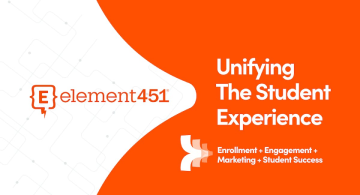
About Element451
Boost enrollment, improve engagement, and support students with an AI-driven CRM and agent platform built for higher ed. Element451 makes personalization scalable and success repeatable.
Categories
New Blog Posts
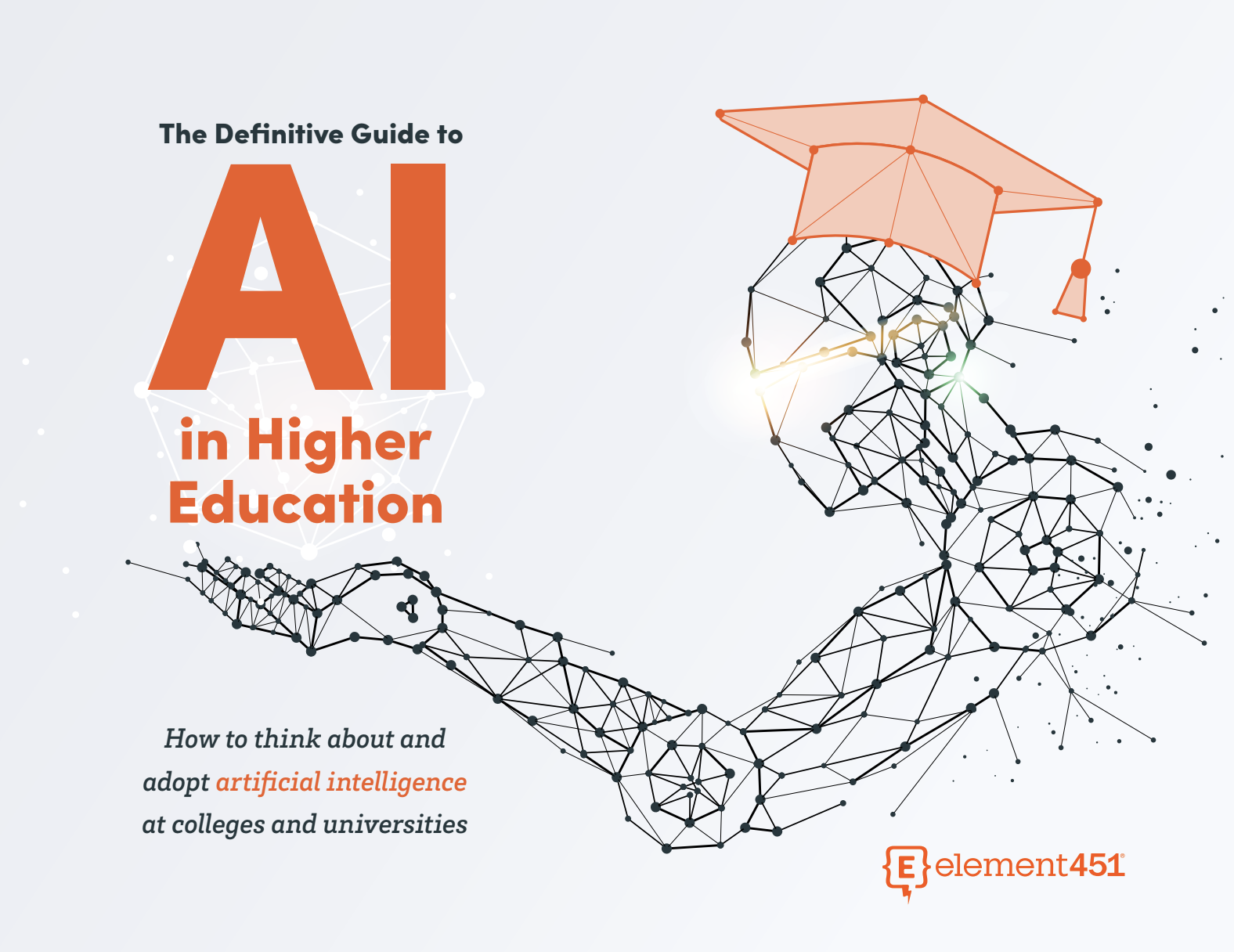
The Definitive Guide
AI in Higher Education
Bridge the gap between the latest tech advancements and your institution's success.
Useful Links

Talk With Us
Element451 is an AI-driven CRM and AI agent platform for higher education. Our friendly experts are here to help you explore how Element451 can improve outcomes for your school and students.
Get a Demo


